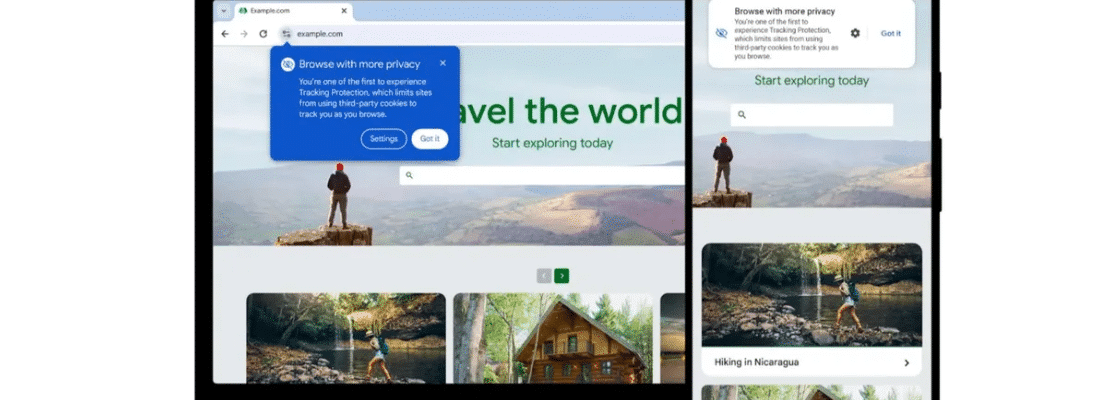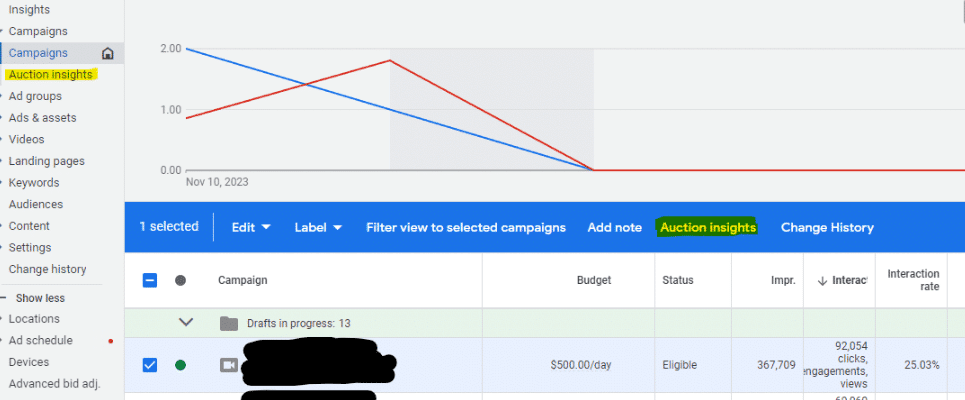As we’ve already entered the New Year, let’s revisit significant PPC strategies and trends from December. Our roundup offers insights and discussions crucial for optimizing upcoming campaigns.
Google reveals next step toward removal of tracking cookies by Social Media Today

Google will begin testing a new tracking protection feature in Chrome to limit cross-site tracking and phase out third-party cookies.
Tracking protection will restrict third-party cookie access and limit cross-site tracking to enhance user privacy. The Privacy Sandbox initiative aims to eliminate third-party cookies by the second half of 2024. The change may affect website functionality, necessitating temporary re-enable of cookies in some cases, while offering more control over data sharing and insights. The move is significant for digital marketing and data analytics, urging marketers to adapt strategies and focus on first-party data collection. This development indicates the continuing trend of prioritizing user privacy in web browsing and online interactions.
Read on Social Media Today
Top 10 tools for PPC agencies by Search Engine Land

The effective tools are crucial for enhancing workflows, automating tasks, and driving campaign success.
These tools are pivotal in the daily operations of PPC agencies, contributing significantly to their growth and ability to manage and scale client campaigns effectively. As technology and AI continue to evolve, these tools may further transform or be replaced, indicating a dynamic future for PPC management.
- Google Product Suite
- DataSlyer
- Zapier
- Google Analytics 4
- DownNotifier
- Canva
- Rich Data Tester
- Google Keyword Planner
- ChatGPT
- Google Tag Manager
Read on Search Engine Land
Researchers extend GPT-4 with new prompting method by Search Engine Journal

Microsoft’s research extends GPT-4 with a new prompting method that achieves unparalleled performance levels in AI tasks.
The study introduces new prompting techniques, notably Chain of Thought (CoT) reasoning and Medprompt, enhancing GPT-4’s capabilities to rival specialized models. CoT, initially developed by Google, involves breaking tasks into reasoned steps for better AI problem-solving. The newly developed Medprompt method, which leverages CoT along with other strategies, has shown to outperform in medical knowledge assessments. The approach incorporates dynamic few-shot selection, self-generated chain of thought, and choice shuffle ensembling to improve the model’s learning efficiency, reduce biases, and increase diversity in responses. These advancements suggest that with sophisticated prompt engineering, general AI models like GPT-4 can deliver specialized performance across various knowledge areas.
Read on Search Engine Journal
Google Ad Tactics for 2024 by Practical Ecommerce

Google’s 2024 ad strategy emphasizes first-party data and AI due to third-party cookie deprecation.
In 2024, Google will remove third-party cookies, shifting advertisers to first-party data and AI. Google tags will collect customized data, while enhanced conversions in Google Ads will match user details for better tracking. Besides, AI will significantly influence ad management, with Google Ads offering new AI features for content creation and optimization. More data-rich campaigns will lead to improved performance, as Google’s machine learning thrives on extensive data. Lastly, advertisers should allow Google Ads autonomy to learn and optimize, focusing on specific goals for more effective targeting and results.
Read on Practical Ecommerce
The Surprising turnaround of Google’s broad match by Skai

Google has improved its match with AI, making it more precise and relevant.
Google’s broad match, often avoided for its overreaching scope, has undergone significant improvements thanks to AI advancements, making it a valuable tool for search marketers. Here’s why it’s worth a second look:
- Googles AI is now better at matching broad topics, and it works well with smart bids and responsive search ads.
- It’s important to test broad match to see if it works better and change strategies based on real data.
- Google suggests that broad match could become a more dominant tool in PPC, capturing a wider range of queries efficiently.
Read on Skai
Research highlights brand safety risks in Google’s Search Partner network by Digiday

Adalytics Research criticizes Google’s Search Partner network for brand safety risks and transparency issues.
Brand safety risks in the Google’s Search Partner network were exposed by Adalytics Research, which found ads next to harmful content, including pirated and adult material. The study criticizes Google’s Performance Max tool for lacking transparency, known as a “black box” with little insight into ad placements. The report calls for closer scrutiny of Big Tech’s advertising algorithms. Despite Google’s commitment to responsible ad placement, the findings emphasize the need for improved oversight and ethical considerations in automated digital advertising.
Read on Digiday
Using auction insights for better PPC competitor analysis by Search Engine Land

Auction Insights in Google Ads and Microsoft Advertising provide key data for enhancing PPC strategies.
It allows monitoring of competitive positions and access to detailed data at various levels for strategic analysis. Key metrics include impression share, overlap rate, and position rates. Besides, the insights help identify new competitors, compare cross-platform strategies, track changes, and monitor brand bidding. Regular application of this data is crucial for informed decision-making and optimizing PPC campaigns.
Read on Search Engine Land
Google to support programmatic bidding for limited ads by Search Engine Journal

Google to launch programmatic bidding for Limited ads in early 2024.
In early 2024, Google will enable programmatic bidding for Limited ads, affecting publishers using AdSense. Limited ads reduce personal data usage in ad targeting to enhance privacy. This new feature allows for contextual ad demand from various sources and doesn’t require user consent for some data uses. Besides, participation is optional and requires publishers to consider legal and consent implications. The feature will default to on, urging publishers to evaluate their policies and adapt accordingly. This move aims to balance user privacy with continued ad revenue opportunities for publishers.
Read on Search Engine Journal
SEO vs. PPC: Pros, cons & differences by Search Engine Journal

SEO and PPC are key, complementary digital marketing strategies, each with unique benefits and drawbacks.
SEO enhances unpaid search rankings, resulting in sustainable traffic and credibility. However, it necessitates a considerable amount of time and ongoing effort. PPC, contrastingly, offers quick, targeted outcomes through paid ads but can be expensive and ceases with the budget. While SEO is more cost-effective and builds long-term trust, PPC is immediate and specific but financially demanding over time. The choice between SEO and PPC varies with budget, industry, and objectives, but ideally, both should be employed together. The integration of SEO and PPC maximizes the impact, utilizing data insights and promoting organic content through paid advertisements. This holistic approach enhances online presence, sales, and leads.
Read on Search Engine Journal
When to use branded and competitor keywords in PPC by Search Engine Land

Bidding on branded and competitor keywords in PPC can boost or risk your brand, depending on strategic use.
Using branded and competitor keywords in PPC has pros and cons. Brand bidding protects your position, increases trust, and offers branding control at a lower cost. However, it might cost for already assured traffic and doesn’t directly bring new customers. Competitor keyword bidding raises visibility and can siphon traffic from rivals, yet it may increase costs, lower ad relevance, and provoke counter-bidding. Effective bidding depends on business goals, competition, and strategy. It requires monitoring competitor bids, tailoring ads to audiences, and intelligent bidding. Employ these tactics judiciously, balancing immediate needs with long-term brand objectives.
Read on Search Engine Land

